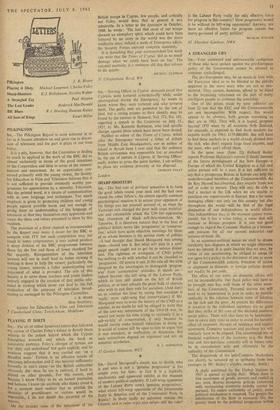SHARP-SHOOTERS Si ,—The first rule of political semantics is to
hang the good labels round your neck and the bad ones round the other fellow's. An almost equally common psychological reaction is to accuse your opponent of the things you are yourself accused of, as when the Victorian rich charged the poor with crass material- ism and colonialists attack the UN for oppressing that champion of black self-determination, Mr. Tshombc. It is therefore natural that in the heat of political debate terms like 'progressive' or 'conserva- tive,' which have quite objective meanings for those of us whose business is the serious study of politics —I had thought that David Marquand was among them—should lose it. But what will pass in a cam- paign speech ought not to get by in serious discus- sion. The rightness or wrongness of CND policy has nothing to do with whether it can be classified as 'progressive.' Of course it can. It fits into all the slots designed by the sociologists to distinguish 'progres- 'sive' from 'conservative' attitudes. It stands on— indeed beyond—the left wing of the Labour Party, which in turn still stands on the left of British politics, or at least attracts the great bulk of electors who wish to cast their vote for socialism. (And don't let us confuse the issue by saying that socialism is 'really' more right-wing that conservatism.) If Mr, Marquand were to write the history of the CND as a scholar, as no doubt he will be obliged to write that of the anti-war movements of the 1914-18 war, he would not waste his time trying to reclassify it as a sub-variety of conservatism, if only because he would merely make himself ridiculous in doing so. It would of course still be open to him to argue that it was mistaken, or ineffective, or disastrous. But such contentions depend on argument and not on semantic acrobatics.
E. J. 11013_513,MM
37 Gordon Mansions, WC1










































 Previous page
Previous page